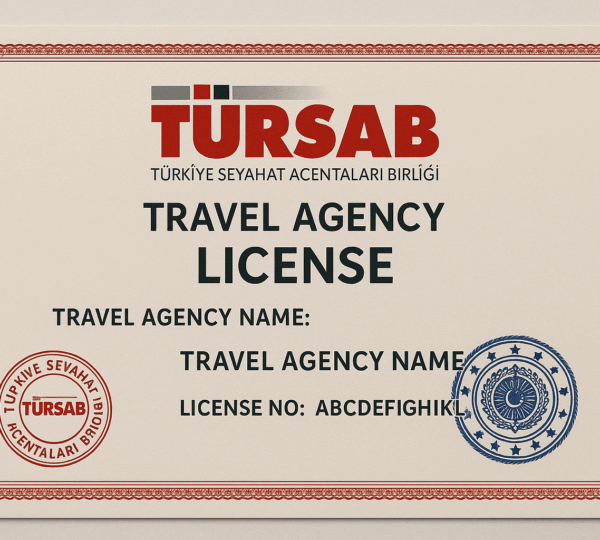
Real Estate Sector in Turkey
Real Estate Sector in Turkey: Trends & Opportunities
Turkey’s real estate industry has witnessed remarkable growth over the past two decades, becoming a crucial sector in the country’s economy. With its strategic location bridging Europe and Asia, a rich history, and a fast-growing population, Turkey offers attractive opportunities for real estate investment. From residential and commercial properties to luxury developments and urban transformation projects, the Turkish real estate market appeals to both local and international investors.
In this article, we delve into the significance of Turkey’s booming real estate sector, highlighting its rapid development and the lucrative opportunities it offers for investors. Additionally, we provide a step-by-step guide for entrepreneurs on how to establish a real estate company in Turkey, ensuring a seamless entry into this thriving market.
Whether you’re an investor seeking high returns or an entrepreneur looking to tap into Turkey’s dynamic real estate industry, this guide has everything you need to get started.
Table of Contents
Overview of Turkey’s Real Estate Industry in Turkey
he real estate sector in Turkey has been one of the primary drivers of economic growth. Over the past decade, it has consistently contributed around 5-6% of Turkey’s GDP and attracted billions of dollars in foreign direct investment (FDI).
Key Highlights
- Market Size: Estimated to exceed $150 billion by 2025.
- Housing Demand: Fueled by a young, growing population and urbanization.
- Commercial Real Estate: Rising demand for office spaces and logistics centers.

Key Factors Driving the Market
Several factors contribute to the growth of the real estate industry in Turkey:
Strategic Location
Turkey’s position as a bridge between Europe, Asia, and the Middle East makes it a hotspot for international trade and tourism, boosting demand for residential and commercial properties.
Economic Growth
Despite fluctuations, Turkey’s economy has shown resilience, encouraging investment in real estate as a stable asset class.
Government Incentives
- Citizenship by Investment: Foreign investors can obtain Turkish citizenship by purchasing properties worth $400,000 or more.
- Tax Benefits: Reduced VAT rates on certain real estate transactions for foreign buyers.
Infrastructure Development
Mega projects like Istanbul Airport, Marmaray Tunnel, and the Istanbul Canal have enhanced connectivity and increased property values in surrounding areas.
Key Features of the Istanbul Financial Center
The Istanbul Financial Center is equipped with world-class facilities and cutting-edge technology to meet the needs of modern financial institutions. Key features include:
- Integrated Smart Infrastructure: High-tech office spaces, energy-efficient buildings, and advanced telecommunications systems.
- Centralized Regulatory Hub: The IFC brings together key regulatory bodies, streamlining compliance and fostering transparency.
- Advanced Transportation Links: Proximity to Istanbul’s international airports, metro lines, and highways ensures seamless connectivity.
- Residential and Commercial Amenities: The center includes luxury apartments, shopping malls, hotels, and conference facilities, offering a holistic environment for professionals and their families.
- Innovation and Fintech Focus: Dedicated zones for fintech companies and startups foster innovation in the financial services sector.
Popular Cities for Real Estate Investment in Turkey
Istanbul
- The economic and cultural heart of Turkey, Istanbul leads the real estate market.
- Prime locations: Bosphorus waterfront, Kadıköy, Levent, and Başakşehir.
- Average property price: $1,500–$5,000 per square meter, depending on location.
Ankara
- The capital city offers affordable housing and growing commercial opportunities.
- Popular areas: Çankaya and Batıkent.
Antalya
- A hotspot for tourism and expats, known for its Mediterranean coastline and luxury developments.
Izmir
- A blend of modern living and traditional charm, with rising demand for coastal properties.
Bursa
- Known for its historical sites and proximity to Istanbul, attracting both local and international investors.
Foreign Investment in Turkish Real Estate
Foreign investment has surged in Turkey’s real estate market, particularly since legislative changes in 2012 that allowed foreign ownership of properties.
Top Foreign Buyers
- Citizens from the Middle East, Europe, and Asia are the most active buyers.
- Countries like Iraq, Iran, Russia, and Germany lead in real estate purchases.
Reasons for Popularity
- Affordability compared to Western markets.
- Favorable exchange rates for foreign buyers.
- Citizenship and residency benefits.
Statistics
- Over 68,000 properties were sold to foreign buyers in 2022, a record-high figure.
Urban Transformation and Infrastructure Projects
Turkey’s ambitious urban transformation projects aim to modernize aging infrastructure and mitigate earthquake risks.
Urban Renewal
- Over 7 million housing units are being renovated under government-backed initiatives.
- Focus areas: Istanbul, Izmir, and Bursa.
Mega Projects
- Istanbul Canal: Expected to boost real estate prices in nearby districts like Arnavutköy.
- North Marmara Highway: Enhances connectivity to suburban developments.
- New Financial Districts: Projects like Istanbul Financial Center are creating demand for commercial spaces.
Challenges Facing for Real Estate Sector in Turkey
Economic Instability
- Fluctuating currency exchange rates and inflation impact construction costs and property prices.
Oversupply
- High levels of housing inventory in some regions have led to price stagnation.
Regulatory Complexity
- Lengthy approval processes and bureaucratic hurdles can deter some investors.
Natural Disasters
- Turkey’s vulnerability to earthquakes necessitates strict compliance with building codes, increasing costs.
Future Trends & Opportunities for Real Estate Sector in Turkey
Sustainable and Smart Housing
- Green building practices and smart home technologies are gaining traction, appealing to environmentally conscious buyers.
Coastal and Resort Properties
- Demand for properties in Antalya, Bodrum, and Fethiye is expected to rise as tourism recovers.
Commercial Real Estate
- Logistics centers and co-working spaces are becoming popular due to the growth of e-commerce and hybrid work models.
Digitalization of Real Estate Transactions
- Online platforms and virtual tours are making property transactions more accessible for international buyers.
How to Set Up a Real Estate Company in Turkey
Setting up a real estate company in Turkey has become increasingly popular among entrepreneurs and investors. With a booming property market and strategic location at the crossroads of Europe, Asia, and the Middle East, Turkey offers a lucrative landscape for real estate ventures. Whether you’re a foreign investor or a local entrepreneur, establishing a real estate company in Turkey involves clear procedures and significant opportunities.
1- Legal Framework for Foreign Entrepreneurs
Foreign investors are allowed to establish companies in Turkey, including real estate firms, under the same conditions as Turkish citizens.
- Key Regulations
- Foreign Ownership: Foreigners can own 100% of a company.
- Property Restrictions: Certain areas, such as military zones, are restricted for foreign-owned entities.
- Licensing: A real estate company must comply with Turkey’s real estate brokerage laws and obtain the necessary operating licenses.
2- Required Documents for Company Registration
- Articles of Association (by mersis system).
- Passport Copies (for foreign investors, translated into Turkish and notarized).
- Tax Identification Number (for foreign investors).
- Proof of Address (for the company’s registered office, Virtual office is available).
- Signature Declarations (of authorized company representatives).
- Trade Registry Application Form (by mersis system).
3- Choose a Company Type
The most common company types for real estate businesses are:
- Joint Stock Company (JSC) (Anonim Şirket)
- Structure: Ideal for larger, corporate businesses, a JSC operates through shareholding. Shareholders’ liability (except for public debts) is limited to their capital investment.
- Capital Requirement: Minimum of 250,000 TL, with 25% to be paid upfront into the company’s bank account before establishment. The remaining amount must be paid within 24 months.
- Benefits: No upper limit on the number of shareholders.It has simplified share transfers. 100% foreign ownership permitted. Shares can be listed on the stock exchange. Most common type of equity company at IFC.
- Responsibilities: Shareholders are not required to act as directors, it is optional, therefore the liabilities of non-director shareholders are limited to their capital amount (excluding public debts).
Learn more about JSCs in Turkey
- Limited Liability Company (LLC)(Limited Şirket)
- Structure: Accommodates 1 to 50 shareholders.
- Capital Requirement: Minimum of 50,000 TL, payable within 24 months.
- Benefits: 100% foreign ownership permitted. Establishment can proceed with zero capital (to be deposited later).Most common type of equity company in Turkey.
- Responsibilities: At least one shareholder must act as a manager. Other directors can be shareholders or external appointees.
Learn more about LLCs in Turkey
- Sole Proprietorship Company(Şahıs Şirketi)
- Structure: Owned and operated by a single individual responsible for all debts and liabilities.
- Benefits: No cash capital required, quick registration and liquidation, low operating costs.
- Drawbacks: Owner is personally responsible for all actions and debts, subject to progressive tax regime.
- Branch Office(Şube)
- Structure: Allows foreign companies to engage in commercial activities in Turkey without establishing a new entity.
- Benefits: No minimum capital requirement, can commence business immediately, can issue invoices and transfer profits outside of Turkey.
- Drawbacks: Limited to the parent company’s scope of activities.
Click the link for more info about Branch Office in Turkey
- Liaison Office(İrtibat Ofisi)
- Structure: Set up by foreign investors for research activities without commercial engagement.
- Benefits: Exempt from corporate income tax and VAT, relatively easy registration and liquidation.
- Drawbacks: Prohibited from commercial activities, cannot issue invoices or transfer profits, time-restricted operations (initially three years, extendable).
Click the link for more info about Liaison Office in Turkey
4. Obtain a Tax Number
- Register with the local tax office to obtain a tax identification number for the company.
5. Open a Bank Account
- Open a corporate bank account in Turkey and deposit the required minimum capital.
7. Obtain Necessary Licenses
- Apply for a real estate brokerage license from the relevant authorities.
- Ensure compliance with local zoning and property management regulations.
8. Register for Social Security
- Register the company and employees with the Social Security Institution (SGK).
9- Taxation and Financial Obligations
Real estate companies in Turkey are subject to the following taxes:
- Corporate Tax: Standard rate: 25% (as of 2023).
- Value Added Tax (VAT): Applies to property sales, usually at 1%, 8%, or 18%, depending on the property type.
- Stamp Duty: Charged on documents such as contracts, typically at 0.189%.
- Withholding Tax (WHT):Withholding tax applies to specific income and payment types, such as self-employment & rental payments, wages, dividends and interest, and royalties, with rates varying by income source. Generally, the tax rate is 20%, with the payer responsible for deducting and remitting it to the government.
Accounting Requirements
- Companies must maintain accurate financial records and submit annual financial statements.
- Hiring a certified accountant is mandatory.
Contact Us to Establish a Real Estate Company in Turkey
Setting up a real estate company in Turkey has become increasingly popular among entrepreneurs and investors. With a booming property market and strategic location at the crossroads of Europe, Asia, and the Middle East, Turkey offers a lucrative landscape for real estate ventures.
Whether you’re a foreign investor or a local entrepreneur, establishing a real estate company in Turkey involves clear procedures and significant opportunities, investors & entrepreneurs can tap into Turkey’s booming property sector and build a successful business, with the right planning.
By understanding the processes, costs, and opportunities involved, investors can position themselves to thrive in one of the world’s most dynamic real estate markets.
A&M Consulting Co. is an business consultancy firm specialized in real estate company registration in Turkey for especially global investor and foreign entrepreneurs.
We continue to provide cost-effective business & tax consulting services to global companies and individual entrepreneurs who want to enter the Turkey’s market smoothly and quickly, fully comply with local legislation.
DISCOVER OUR SERVICES:
- Company Registration in Turkey
- Tax Services in Turkey
- Accounting & Bookeeping Services
- HR & Payroll Services
- Business Consultancy for Turkey
- Social Security Registration
- Virtual Office & Legal Address in Turkey
- Turkish Citizenship
- Turkey Work Visa
- Turkiye Tech Visa
- Establishment of Association in Turkey
- Foundation Registration in Turkey
- Company Winding Up in Turkey
You can reach out to our experienced consultans via email or by filling out the Contact Form on our website’s contact page
FAQs About Turkey's Real Estate Sector
Turkey’s strategic location, growing economy, urban transformation projects, and government incentives like the Citizenship by Investment program make its real estate market appealing to both local and international investors.
Yes, foreigners can buy property in Turkey, except in restricted areas such as military zones. There are no citizenship requirements, but specific rules and procedures must be followed.
Foreigners and locals can buy residential, commercial, industrial, and agricultural properties, subject to certain zoning and regulatory conditions.
Property prices vary widely depending on location, type, and size. For instance, residential properties in Istanbul may cost between $1,500 to $5,000 per square meter, while smaller cities are more affordable.
Foreigners who purchase property worth at least $400,000 can apply for Turkish citizenship. The property must be held for at least three years to maintain eligibility.
- Property Purchase Tax: 4% of the property’s sale price (shared between buyer and seller).
- VAT: Applies to brand-new residences. Varies between 1% and 18% depending on the square meter of the property.
- Annual Property Tax: Between 0.1% and 0.6%, depending on property location and type.
- Valuable Housing Tax: It is a type of tax collected at rates ranging from 0.3% to 1% on real estate whose value exceeds a certain threshold. It targets those who own more than one real estate. The thresholds for 2024 are as follows.
- For properties valued between TRY 9,967,000 and TRY 14,952,000: 0.3%
- For properties valued between TRY 14,952,001 and TRY 19,936,000: 0.6%
- For properties valued above TRY 19,936,000: 1%
- Passport (translated and notarized).
- Tax identification number.
- Proof of address.
- Property title deed (Tapu).
- Appraisal report (Ekspertiz Raporu).
The Tapu is the official title deed that confirms ownership of a property in Turkey. It is issued by the local land registry office.
Yes, banks in Turkey offer mortgage loans to both local and foreign buyers. Loan terms, interest rates, and eligibility criteria vary depending on the buyer’s profile and property type.
- Istanbul: The economic and cultural hub, offering high returns.
- Antalya: Popular for tourism and luxury properties.
- Izmir: Known for its coastal charm and growing market.
- Bursa: Affordable housing and proximity to Istanbul.
There are no general restrictions on reselling properties, but for properties purchased under the Citizenship by Investment program, the buyer must hold the property for at least three years.
Real estate agents assist with property searches, negotiations, documentation, and ensuring compliance with Turkish real estate laws.
Yes, property owners can rent out their residential or commercial properties and earn rental income. However, rental income is subject to taxation in Turkey.
- Location and property type.
- Market trends and demand.
- Legal and regulatory requirements.
- Tax obligations and costs.
Urban transformation projects aim to renovate old and unsafe buildings, especially in earthquake-prone areas, creating new opportunities for real estate investment.
The ROI varies depending on property type and location but typically ranges between 4% and 8% annually for rental properties, with potential for capital appreciation.
Inflation can increase construction costs and property prices, but real estate often acts as a hedge against inflation, attracting investors seeking stable assets.
- Smart and sustainable housing developments.
- Increased demand for coastal and resort properties.
- Growth in commercial real estate due to e-commerce and hybrid work models.
Yes, foreigners can establish a real estate company in Turkey. They enjoy the same rights as Turkish citizens, with no restrictions on company ownership, except in certain restricted zones such as military areas.
The most common types of companies for real estate businesses in Turkey are:
- Limited Liability Company (LLC) (Limited Şirket): Ideal for small to medium businesses.
- Joint Stock Company (JSC) (Anonim Şirket): Suitable for larger ventures requiring significant capital.
Yes, you need a real estate brokerage license to operate legally. Additional permits may be required depending on the nature of your business, such as property management or development.
- Choose a company type (LLC or JSC).
- Prepare and notarize the Articles of Association.
- Submit required documents to the Trade Registry Office.
- Obtain a tax identification number.
- Open a corporate bank account and deposit the required capital.
- Apply for licenses and permits.
- Register with the Social Security Institution (SGK).
Foreign-owned real estate companies can operate nationwide, except in restricted zones such as military areas or strategic locations.
Yes, a registered office address is mandatory for company registration. You can either rent or use a virtual office service initially.
- Corporate Tax: 25% of profits.
- VAT: 1%, 8%, 18% or 20%, depending on the property type.
- Stamp Duty: 0.189% on certain documents.
- WHT : 20% for some payments such as freelancers, salaries, business place rent payments
Yes, real estate companies can develop, manage, and sell properties. Ensure compliance with zoning laws and obtain any necessary permits for construction.
Yes, real estate companies can manage rental properties, including residential and commercial spaces. This can include marketing, tenant management, and maintenance services.
While it’s helpful to be in Turkey during the setup process, you can appoint a legal representative like a Turkish Accountant with a notarized power of attorney to handle the process on your behalf.
- Navigating complex regulations and permits.
- Understanding local market dynamics and competition.
- Managing currency fluctuations and economic instability.
Yes, your company can cater to international clients by offering property brokerage, consultancy, and legal assistance services.
Yes, strategies such as digital marketing, leveraging online real estate platforms, and partnerships with international brokers can help you succeed in Turkey’s competitive real estate market.



